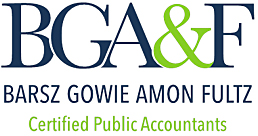Entrepreneurs have a slew of things to think about (and worry about) when they start a new business venture. Yet, with all the planning that goes into the launch of the new startup, issues related to accounting and taxes are often put off until the very end.
It’s a mistake.
Accounting firms which specialize in business startups have accounting experts on staff who work to align themselves with a small business’ financial goals and help them think through the finer details they may otherwise worry about later, like setting up the business in ways that will be advantageous to the bottom line.
If you’re thinking of starting a new business, the business accounting experts at Barsz Gowie Amon & Fultz share these six tax tips for startups:
- Business Structure. Whether you’re a sole proprietor, a partnership, or an S or C corporation, there are different advantages and disadvantages to each, and different tax rules and filing requirements. It’s crucial to know which is right for you and your business before you hang up your shingle.
- Employer Identification Number (EIN). The IRS, contractors/subcontracts, customers, and others identify your business by your EIN. This may depend slightly on the business structure you choose, but an EIN can be obtained online from the IRS.
- Tax Year. Many business owners don’t stop to determine the best time for the business to file tax, whether in a calendar or fiscal year, and why they should even consider it. The accountants at Barsz Gowie Amon & Fultz help talk through issues like this, focusing on the bottom line and taking a variety of factors into account before helping you make that decision.
- Business Tax Classifications. Depending on the business structure, there are different ways to compute Income, Self Employment (SE), Employment, and Excise taxes, to name a few. Also, it may be better for a business to make estimated quarterly tax payments through the year instead of a whopping end-of-year one. A CPA can help work through these.
- Preferred Accounting Method. The two most common methods for accounting are the cash method, in which taxpayers report income and deduct expenses in the year they occur; and the accrual method, where businesses report and deduct taxes in the year income and expenses are earned or incurred, even if they get the income or pay the expense in a later year. Once again, if accounting isn’t your forte, let the experts guide you through this.
- Record-Keeping. Business owners would do well to make sure they keep clear and solid records of income, expenses, basis in property, purchases, sales, payroll, and other processes crucial to accounting and taxes. Enlist the help of a CPA to help with bookkeeping and other record-keeping through the year if this isn’t your area of expertise. Know what can and cannot be considered a business expense, and learn the best way to keep track of how and where your business is growing, and where an expert may help you become more efficient.
Contact Barsz Gowie Amon & Fultz if you’re getting ready to start a new business or need help guiding the one you have.
